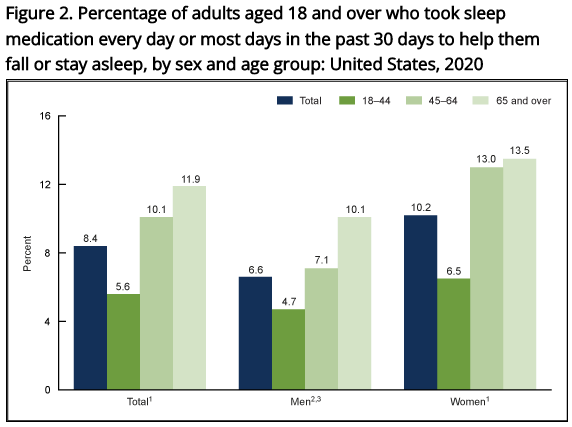The Alarming Reality of Sleep Medications: Risks and Alternatives
Written on
Understanding the Risks of Sleep Medications
Before you consider taking another sleep medication, it's important to reflect on several harsh truths: many common sleep aids are not as effective as advertised; their side effects can range from mild discomfort to severe health risks, including death; and ironically, these medications can lead to unsettling "complex sleep behaviors" while leaving you feeling drowsy the next day.
Often, these medications act as superficial solutions for deeper issues, worsening the situation rather than alleviating it. The evidence showcasing the ineffectiveness and risks associated with both prescription and over-the-counter sleep drugs is substantial. While they may serve a purpose for certain severe insomnia cases, it is crucial to use them only under strict medical supervision. Instead, we should focus on various proven, natural methods to enhance our sleep quality.
Dr. Preeti Malani from the University of Michigan emphasizes that sleep issues can arise at any age for various reasons, but they cannot be resolved simply by taking a pill, whether it's a prescription, over-the-counter, or even herbal remedy, regardless of what advertisements claim.
Dr. Susheel Patil, director of the Sleep Medicine Program at University Hospitals in Ohio, warns that even when sleep medications are helpful for diagnosed disorders, their effectiveness diminishes with continuous use. "We really want to avoid medications as much as possible," Patil stated during a phone interview while I was researching better sleep strategies. "While they can be beneficial in the short term, most individuals build up a tolerance over time."
The Dangers of Prescription Sleep Aids
Research has long shown that sleep medications can pose significant risks, especially prescription varieties. Common medications like temazepam (Restoril), eszopiclone (Lunesta), zolpidem (Ambien), and zaleplon (Sonata) are known for serious side effects. A study conducted over two years found that individuals using prescription sleep aids were several times more likely to die than those who did not. Alarmingly, among heavy users who survived, cancer rates increased.
Additionally, recent studies indicate that older adults starting benzodiazepines, such as Valium, Xanax, and Klonopin, are more than twice as likely to suffer falls resulting in hip fractures during the first two weeks of treatment. More recent research published in the Journal of Alzheimer’s Disease has also linked prescription sleep medications to a heightened risk of developing dementia.
You don't need to rely solely on scientific studies to understand the hazards of these medications—manufacturer warnings are telling. For instance, Lunesta's website lists severe risks such as "worsening of depression or suicidal thoughts" and "impaired alertness and motor coordination." Other alarming side effects include "complex sleep behaviors," where individuals may engage in activities like sleepwalking or sleep-driving without being fully conscious. Ambien warns of similar risks, including confusion, dizziness, and the potential for memory loss regarding nighttime activities.
Despite the documented ineffectiveness of over-the-counter sleep aids—supported by institutions like the Mayo Clinic and the Cleveland Clinic—many Americans continue to rely on them. According to a recent analysis by the CDC, over 6% of U.S. adults take prescription or over-the-counter sleep medications daily, with women and seniors being the most frequent users.

Natural Strategies for Better Sleep
Achieving quality deep sleep is vital for various health benefits, including detoxifying the brain, solidifying memories, regulating emotions, and rejuvenating the body at a cellular level. Establishing a straightforward strategy that incorporates several well-researched factors can greatly enhance sleep quality:
- Establish a Routine: Maintaining consistent bedtimes and wake-up times is crucial. Our bodies have evolved to sync with the natural light-dark cycle, and a regular sleep schedule can significantly improve sleep quality.
- Seek Natural Light: Exposure to natural sunlight plays a critical role in regulating the body's internal clock, or circadian rhythm, which influences melatonin production. Studies show that even minimal morning light exposure can positively affect sleep patterns.
- Stay Active: Engaging in daily physical activity, even a simple brisk walk, can vastly improve sleep quality. Research indicates that individuals in better physical condition are less likely to resort to prescription sleep aids.
For more tips on enhancing your sleep quality, consider exploring various natural remedies and lifestyle changes.
Your support makes my health and wellness writing possible. You can sign up for emails when I publish on Medium, or join Medium to directly support me and gain full access to all Medium stories, get my health news briefs on Mastodon, or check out my book: Make Sleep Your Superpower: A Guide to Greater Health, Happiness & Productivity (paperback or Kindle version). — Rob
Chapter 2: The Risks of Sleeping Pills
In this chapter, we dive deeper into the dangers associated with sleep medications and their impact on health.
The first video discusses the potential dangers of sleeping pills, highlighting their risks and side effects.
The second video presents research findings on the dangers of sleeping pills, particularly focusing on aging populations and their increased risks.